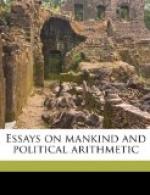Almost all countries in the world have been more or less populous, as liberty and property have been there well or ill secured. The first constitution of Rome was no ill-founded government, a kingly power limited by laws; and the people increased so fast, that, from a small beginning, in the reign of their sixth king were they able to send out an army of 80,000 men. And in the time of the commonwealth, in that invasion which the Gauls made upon Italy, not long before Hannibal came thither, they were grown so numerous, as that their troops consisted of 700,000 foot and 70,000 horse; it is true their allies were comprehended in this number, but the ordinary people fit to bear arms being mustered in Rome and Campania, amounted to 250,000 foot and 23,000 horse.
Nothing, therefore, can more contribute to the rendering England populous and strong than to have liberty upon a right footing, and our legal constitution firmly preserved. A nation may be as well called free under a limited kingship as in a commonwealth, and it is to this good form of our government that we partly owe that doubling of the people which has probably happened here in the 435 years last past. And if the ambition of some, and the mercenary temper of others, should bring us at any time to alter our constitution, and to give up our ancient rights, we shall find our numbers diminish visibly and fast. For liberty encourages procreation, and not only keeps our own inhabitants among us, but invites strangers to come and live under the shelter of our laws.
The Romans, indeed, made use of an adventitious help to enlarge their city, which was by incorporating foreign cities and nations into their commonwealth; but this way is not without its mischiefs. For the strangers in Rome by degrees had grown so numerous, and to have so great a vote in the councils, that the whole Government began to totter, and decline from its old to its new inhabitants, which Fabius the censor observing, he applied a remedy in time by reducing all the new citizens into four tribes, that being contracted into so narrow a space, they might not have so malignant an influence upon the city.
An Act of general naturalisation would likewise probably increase our numbers very fast, and repair what loss we may have suffered in our people by the late war. It is a matter that has been very warmly contended for by many good patriots; but peradventure it carries also its danger with it, which perhaps would have the less influence by this expedient, namely, if an Act of Parliament were made, that no heads of families hereafter to be naturalised for the first generation, should have votes in any of our elections. But as the case stands, it seems against the nature of right government that strangers (who may be spies, and who may have an interest opposite to that of England, and who at best ever join in one link of obsequiousness to the Ministers) should be suffered to intermeddle in that important business of sending members to Parliament. From their sons indeed there is less to fear, who by birth and nature may come to have the same interest and inclinations as the natives.




